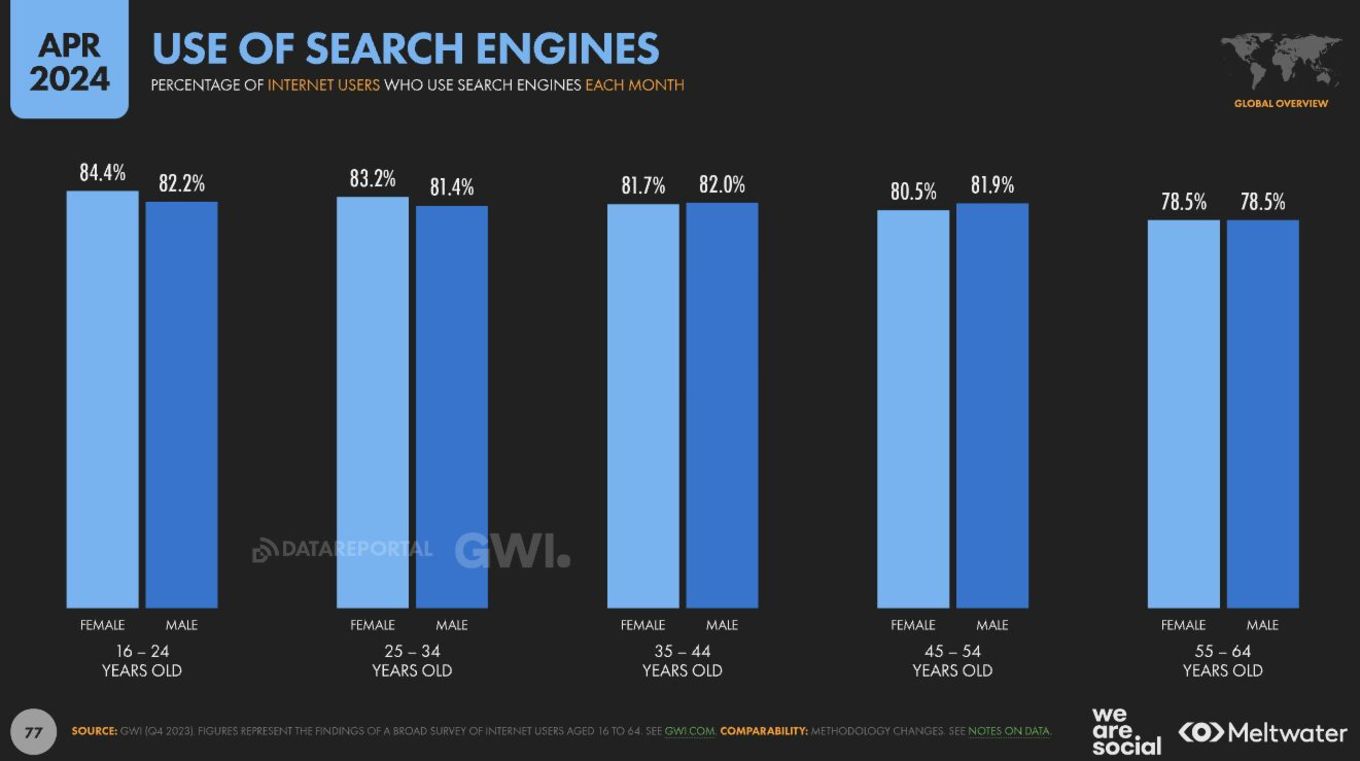Control AI, Not Vice Versa

This Hot Take was written by Joel Goodman
Yeah, I know. More blathering about AI. As if you don’t see enough of it on LinkedIn, in the news, and everywhere else in your inbox. I know how hard it is to be vigilant in parsing all of those messages, so I am going to try to bring that master’s in Media Studies to bear and give you some ways to think about things.
The Education Marketer himself, Kyle Campbell, recently posted data from a GWI study that shows search engine usage is still up among higher education’s target demographics. Despite lots of posturing to the contrary, SEO isn’t going anywhere for a while. And while that mix may change over the next several years, Google is a behemoth with piles of cash to spend on retaining current users and growing with future ones.

On top of that, we’ve seen a shift in the past year in how we discover new things and get our questions answered. It started with ChatGPT and progressed to half a dozen similar chat-based LLMs (that’s Large Language Models, the tech powering your favorite AI bots) and my personal favorite, Perplexity. And here, in the middle of 2024, we’ve seen substantial changes to the web products we use every day.
Google rolled out AI summaries at the top of most search result pages. Meta put that annoying little AI search assistant in Instagram. Microsoft put Copilot front and center in Bing last year. LinkedIn offers really bad AI prompts if you’re a paid subscriber. And these are the obvious ones.
But let’s back up to those AI summaries in Google (and soon TikTok!?). Nilay Patel, the editor at The Verge, has been talking about this shift for at least a year now. He calls this Google Zero, the feature where Google summarizes the content of your search results to give you zero-click answers right on the results page. Nilay does a great interview with Google’s CEO, Sundar Pichai, and you should definitley check it out.
Zero-click is good, right? #
Marketing social is all-in on zero-click content. And so am I, to be honest. I’ve come to terms with Twitter’s demise, the inconsistent performance of LinkedIn, and the algorithmic prejudices toward posts with links. The problem for colleges and universities is that we don’t have zero-click strategies.
What do I mean by zero-click? Amanda Natividad (who is a great social follow btw) defines zero-click content as:
“content that offers valuable, standalone insights (or simply engaging material), with no need to click. Clicking might be additive, but it’s not required.”
Sounds great, right? This newsletter is built to be zero-click. We hope you get a ton of value from it without ever having to go outside your inbox. We appreciate it if you click a link, but that’s not the goal here. Native content on a native platform that connects with you where you are proves to be the best content for building trust. And sometimes trust turns into business.
The trouble here is that higher ed has all its content on monolithic websites with questionable content strategies and user experiences constantly needing improvement. Then, we post fluff on social media alongside paid ads.
Heed the signs #
Okay, so what does this mean? Simply put, as more products summarize your content, fewer people will go to your website.
To be a bit more blunt — if your website content isn’t optimized to be picked up and summarized by these AI models, you will see a severe drop in traffic and leads as competitor institutions are recommended over yours. What we know right now (and this is subject to change as LLMs mature) is that LLMs rank, promote, and demote content based on a lot of the same criteria search engines do. So, if your SEO wasn’t great before, it’s critical to fix it now.
And here’s another quiet part shouted as loud as possible. AI products crammed into your website won’t do you any good if no one can find your site in the first place. You’ll just be piling onto a bad UX and content strategy.
People aren’t going to use your AI assistant over Perplexity or ChatGPT because those products are better and have better name recognition. This is Site Search all over again.
What to do #
So what should you do?
- First, don’t spend money on that AI-powered assistant until you fix your content strategy. It’s a rebranded chatbot and a waste of funds. Put that expenditure off and invest in your website’s content.
- As an institution of higher education, you already have search authority. Now it’s time to use it. Get other websites citing your content. Answer questions clearly on your pages. Speed up your web loading times.
- Invest in a zero-click strategy before you’re forced into one. Make content native to the various platforms you use, but more importantly, make sure that content provides value without a click.
Bravery can help #
Whether you need support optimizing your content for AI, a whole content strategy, or getting your in-house team up to speed on future tech, Bravery exists to support you. We promise no pressure, total transparency, and a focus on bringing your institution results.